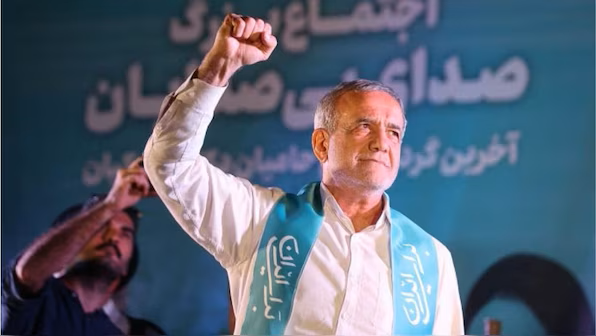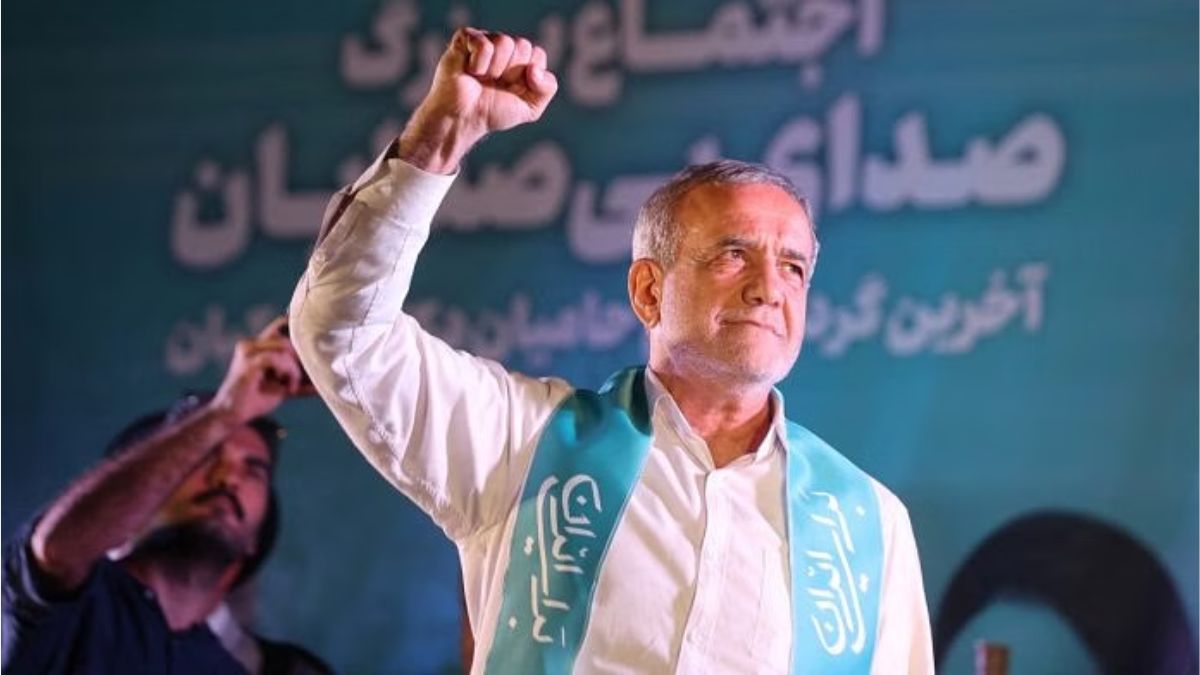Iran and the West: Thawing of relations post presidential poll result?
- August 13, 2024
- Posted by: Anil Trigunayat
- Category: Iran

Iran’s President-elect Masoud Pezeshkian contested on the premise that he would bring about reforms and moderation at home and greater outreach in foreign policy
)
)
Masoud Pezeshkian. File Photo
Iran, one of the oldest democracies in the region, has been governed by Islamic theocracy blended with democratic institutions, even if accused of being more selective than elective by the West. But having reformist presidents in a broadly conservative political landscape is something that needs to be appreciated. Recent elections are not an exception, which were necessitated by the sudden death of President Ebrahim Raisi in the weird helicopter accident along with his Foreign Minister Abdollahian, among others.
Advertisement
Several presidential hopefuls were projected; some were dropped and others dropped out for the June 28 elections, in which none of the candidates could get the prescribed majority of 50 per cent to be declared winners. Hence the runoff on July 5 between the two top grossers, which included Masoud Pezeshkian, a reformist candidate, and Saeed Jalili, a conservative preferred by the Ayatollah, who would have followed the same policies as the late Ebrahim Raisi.
However, the Iranians, suffering through the sanctioned economy, dearth of opportunities, and general distrust in the way things are in Iran, voted to elect Pezeshkian, who in the runoff got nearly 53.7 per cent of vote share defeating Saeed Jalili by three million votes on his ‘For Iran’ campaign. Earlier, the voters empathy and interest were missing, but in the runoff, 49.8 per cent of the 61 million voters cast their vote, which was reasonably higher than the dismal 39.9 per cent in the first round. Even though the margin may not be very high, to call it a decisive mood in the country and to extrapolate it to say that the Iranians are completely unhappy with the state of play in the country would only be half the truth. But the message is clear.
You May Like
War Thunder – Register now for free and play against over 75 Million real PlayersWar ThunderPlay Now
Pezeshkian contested on the premise that he would bring about reforms and moderation at home and greater outreach in foreign policy, including with the West as well. He will take over in the next 30 days and will be sworn in as the ninth president of the Islamic Republic. Supreme Leader Ayatollah Khamanei said that the election boycott campaign by the enemies was defeated and that the president and government must focus on improving the country and lives of the people and ‘preserving the establishment’. He may have his governance challenges as the Parliament is broadly dominated by conservatives and hardliners; hence, treading the cautious path could possibly be the way in the beginning. However, Speaker of Majlis Mohammad Bagher Ghalibaf, who finished third in the elections and was said to be the favourite, assured the President-elect that the Parliament would help the new administration. Hopefully, the Parliament will let him choose his foreign and economy ministers and the cabinet in general. It is expected that former Foreign Minister Jawad Zarif (widely criticised by the conservatives and a major supporter of the new President) and former Economy Minister Ali Tayebnia (with a proven record) might return.
Advertisement
Saudi King and Crown Prince Salman and many of the leaders from across the world welcomed the successful elections and congratulated Pezeshkian. Leaders of Russia and China also expressed hope that they would continue to work closely with the new administration. Given his penchant for peace and progress, his efforts to de-escalate tensions may have given greater comfort to regional powers, even though his own powers in this regard will have inherent limitations given the subjective mix of the Iranian governance architecture. But issues pertaining to domestic discontent, isolation, the economic downturn, and attendant issues are problems that will have to be addressed irrespective of those limitations since time for turnaround and delivery will be shortening by the day.
Advertisement
The outcome of US elections later in the year and expanding rightist dispensations in Europe and elsewhere will have their own impact on the way the Iranians will respond and contend with. The fate of the Iran Nuclear Deal (Joint Comprehensive Plan of Action) remains in a limbo, which has destabilising potential since Tehran and its conservative establishment will not take kindly to the Western rebuff much longer. This could be an ongoing challenge for the new president, especially as he moves to relax hijab enforcement and outreach to the West.
Pezeshkian’s message to Iranians is quite telling—informing them of his difficulties and his resolve to overcome them, at least for now. He said, “The difficult path ahead will not be smooth except with your companionship, empathy, and trust. I extend my hand to you, and I swear on my honor that I will not leave you alone on this path. Do not leave me alone.”
Advertisement
Indian Prime Minister Narendra Modi, who has been sincerely engaged in developing the civilisational strategic relationship with Iran on mutually beneficial terms despite the difficulties due to Western sanctions, congratulated Pezeshkian on X, stating, ‘“Congratulations @drpezeshkian on your election as the President of the Islamic Republic of Iran. Looking forward to working closely with you to further strengthen our warm and long-standing bilateral relationship for the benefit of our peoples and the region”.
India-Iran relations have picked up steam in recent times. India has refocused on the development of the strategic Chabahar port and its inclusion in the International North-South Transport Corridor (INSTC). India and Iran also signed a ten-year Chabahar Port Management Project, which will help in its rounded development and better utilisation of the facilities.
Advertisement
Regular, high-level exchanges have continued. PM Modi met late President Raisi last year in Johannesburg, when New Delhi supported Iran as a new member of the BRICS along with Saudi Arabia, the UAE, Ethiopia, and Egypt. In addition, under India’s presidency of the Shanghai Cooperation Organisation (SCO), Iran was admitted into its fold as a full member. Hence, greater regional cooperation in these organisations has become commonplace. Foreign Minister Jaishankar was the first foreign leader to call on the then-newly elected President Raisi. The Indian Parliament paid homage to the deceased President Raisi in its very first session.
All these clearly subscribe to the sincere intent of further enriching bilateral ties and collaboration in the regional matrix. Of course, New Delhi will have to deal with the Iranian request to resume the import of Iranian crude, which used to account for nearly 11 per cent of Indian imports but was reduced to near zero due to the Countering America’s Adversaries Through Sanctions Act (CAATSA) sanctions by the US. New Delhi’s continued import of oil from a highly sanctioned Russia gives Tehran the leeway to raise the issue. Iran is also central to India’s connectivity aspirations with Afghanistan and its ‘Connect Central Asia’ policy.
Regional security in the Middle East is a major concern for India, especially as the Israel-Gaza war has every element of escalation that could flare up, and Tehran is a key pivot in this dynamic. Hence, it is imperative that India and Iran confer more frequently, along with other stakeholders, to ensure and avoid accidental escalation, even if not designed.
The author is the former Indian Ambassador to Jordan, Libya and Malta and is currently a Distinguished Fellow with Vivekananda International Foundation. Views expressed in the above piece are personal and solely those of the author.
